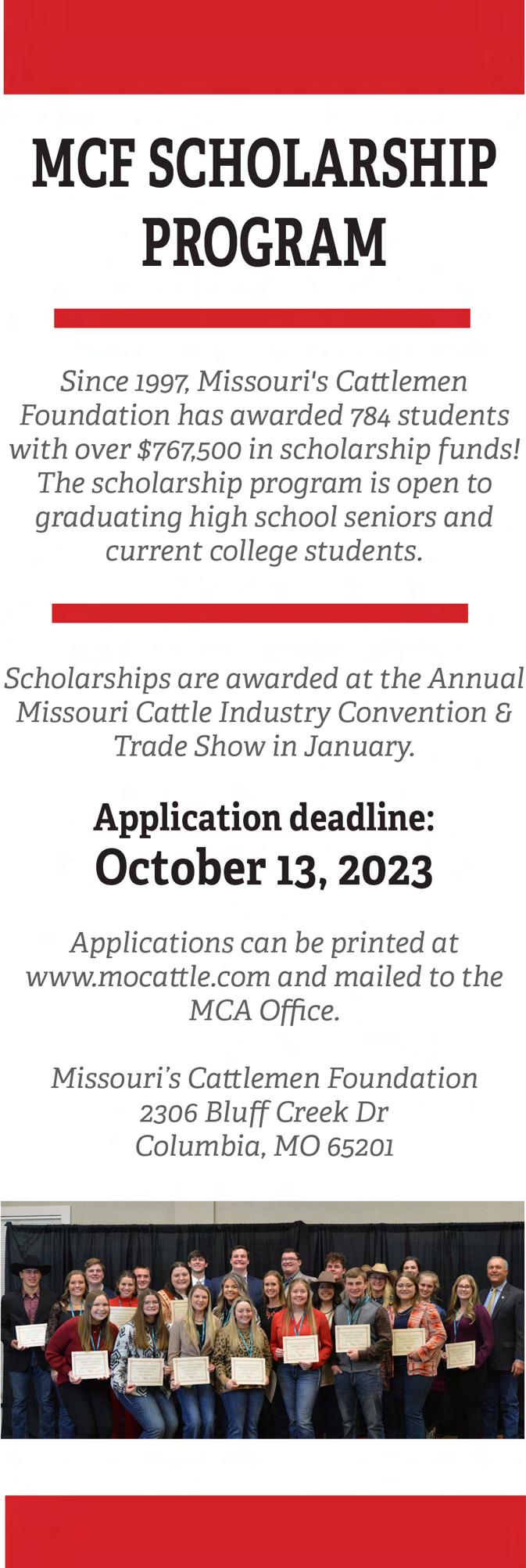
3 minute read
South Central Cattlemen
The South Central Cattlemen met for their monthly meeting on Thursday, May 18, at the Extension Office in West Plains. Members and guests dined on pizza from Domino’s provided by the SCCA. There were approximately 68 members present.
Dinner was started with a blessing offered by member Sam Collins. President Dan Corman opened the meeting, welcoming all members and guests. He encouraged those that were not members to become members.
Jenny spoke about the upcoming MJCA Youth Industry Tour in August. Janet Crow introduced Christen Byrd with the USDA who spoke about current farm loan programs offered through the USDA.
Dr. Craig Payne, director of veterinary extensions from the University of Missouri - Columbia, discussed the upcoming antibiotic prescription changes that are to occur in June 2023. He stated that currently 96% of all medically important antibiotics used in food producing animals come under veterinary oversight. In June, the remaining 4% of OTC antibiotics will be required to have a veterinary prescription. Dr. Payne then went over frequently asked questions regarding the upcoming change. Some of the questions were:
1. When will a prescription be required? The change should be completed by June 11, 2023; however, antibiotic packaging is currently being printed with “Caution: Federal law restricts this drug to use by or on the order of a licensed veterinarian.” on it. Any bottle/packaging with this statement on it is required to have a prescription for it.
2. What do I do with antibiotics prior to the label change? Use them.
3. Does this impact vaccine use? No.
4. How do I get a VCPR (veterinarian-clientpatient relationship? That is up to your herd veterinarian.
5. I currently have a VCPR with my veterinarian. Will I need to do anything different? No. He then turned the floor over to Dr. Mikael Orchard of Barn Hollow.
Dr. Orchard discussed what a VCPR was and how to establish one. Per the American Veterinary Medical Association, the veterinarian will need to feel confident that the farmer/rancher will use the medicine as prescribed. Dr. Orchard went on to explain the value added to your farm by having an established VCPR, which included:
• Pregnancy diagnosis
• Breeding soundness exams
• Herd health plans
• Herd health monitoring
• Nutrition advice
• Increased calf number/cow
• Decreased respiratory diseases
• Increased profit
He then opened the floor up to questions from the group.
The South Central Cattlemen met on Saturday, June 3, for a field day at Corman Charolais in Pomona, Missouri, in place of their monthly meeting. Members and guests dined on hamburgers and all beef hot dogs provided by the Corman family and grilled by Adam Webb. There were approximately 42 members and guests present.
The day started off with President Dan Corman giving a special thank you to his wife, Connie, their children and their spouses, and grandchildren for all of their help planning and setting up for the field day; Tyler Osborn and Dan’s son-in-law, Josh Boehm for pulling the hay trailers during our tour; and to Adam Webb for grilling our lunch. Dan then gave us a brief history of his family farm. He further explained that some of the cattle in his herd are 14-22 generations of Corman breeding. Corman Charolais is primarily a fall calving herd. They expect to have approximately 40 head to calve in August. They practice intensive rotational grazing and strive to provide exceptional pasture for their herd. The Cormans use Gallagher Fence Chargers and fencing and have recently started using Timeless Fence posts in their fields. One of the benefits of using the Timeless Fence post is the posts come pre-drilled, which prevents deer from “popping off the insulators” when they run through the fence.
Agronomist Sarah Kenyon from the University of Missouri Extension Office spoke on the various grasses that the Corman’s have and their effect on cattle. She mentioned the importance of rotating fields in order to avoid toxicity issues in cattle. Livestock Specialist Elizabeth Picking from the University of Missouri Extension spoke on the importance of record keeping for your herd. By keeping accurate records, a producer will know what treatments individual cattle have received, which cattle required calving assistance, generational information, etc.
After our tour of the pastures, we enjoyed our lunch at one of Dan’s hay barns. We were blessed with a lot of good information, food and weather. Due to vacations and busy schedules, the South Central Cattlemen will not have a meeting in July. We will meet again in August with a meeting date TBD.









